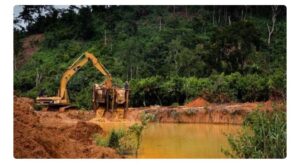Controversial Court Ruling on Seized Galamsey Excavators Sparks National Outrage
 A recent court ruling ordering the release of excavators seized from illegal miners has ignited widespread anger across Ghana. Environmental advocates, legal experts, and concerned citizens are questioning the legitimacy of the Enchi District Court’s decision, calling it a major setback in the country’s fight against illegal mining, popularly known as galamsey.
A recent court ruling ordering the release of excavators seized from illegal miners has ignited widespread anger across Ghana. Environmental advocates, legal experts, and concerned citizens are questioning the legitimacy of the Enchi District Court’s decision, calling it a major setback in the country’s fight against illegal mining, popularly known as galamsey.
Ghana’s forests and water bodies have suffered immense destruction due to illegal mining activities. In response, the government established various task forces, including the Forestry Commission’s Rapid Response Team, to clamp down on offenders. These efforts have led to arrests and equipment seizures, which were meant to serve as deterrents. However, the latest court decision appears to have undermined these measures, raising concerns about judicial accountability and the future of Ghana’s natural resources.
The case in question involves Wisdom Amuzu and three others who were arrested on March 23, 2025, for illegally mining in the Boin River Forest Reserve. The Forestry Commission and the Enchi police seized two excavators found at the scene treating them as key evidence in the case. However in a move that has shocked many Magistrate Lawrence Buenor Buer granted bail to the suspects and ordered the return of the excavators. The court instructed the Forestry Commission to allow Amuzu to move the excavators and other mining equipment to a location of his choice with supervision from the Enchi District Police Commander.
This ruling has raised serious legal concerns as it appears to contradict multiple laws governing illegal mining and environmental protection.
1. Forest Protection Act, 1974 (NRCD 243)
According to Section 4.1 of this Act forestry officers are mandated to take all necessary steps to prevent offences against protected forests. The presence of excavators in the forest reserve and their subsequent seizure by authorities suggest that the law was being enforced. So, why did the court order their release?
2. Minerals and Mining Regulations, 2020 (L.I. 2404)
Regulation 8(3) states that Any equipment used in the commission of an offence under sub-regulation (1) and a product derived from the commission of the offence shall regardless of the ownership of the equipment or product be seized and kept in the custody of the Police. If this law is clear, why did Magistrate Buenor Buer order the return of the seized excavators?
3. Minerals and Mining (Amendment) Act, 2019 (Act 995)
Section 8 of this law mandates that all equipment used in illegal mining should be seized and kept in police custody. If the suspects are convicted, the law requires the forfeiture of such equipment to the state. The Act specifically removes judicial discretion on the matter, meaning the magistrate had no legal basis to order the return of the excavators.
This ruling has raised urgent concerns about how the judiciary handles galamsey-related cases. Critics argue that such decisions undermine national efforts to combat illegal mining and set a dangerous precedent. Some legal analysts, including Lawyer Samson Lardy Anyenini have pointed out that the magistrate’s ruling is inconsistent with the law suggesting possible judicial overreach.
Environmental journalist Erastus Asare Donkor has described the ruling as a slap in the face of the fight against illegal mining. Many activists believe that if such decisions continue, they could embolden illegal miners and further weaken enforcement efforts.
The fallout from this ruling is not just legal—it is personal. Forestry Commission officials who risk their lives to stop illegal miners are now questioning their safety and motivation. In a tragic recent incident, a Forestry Commission officer was brutally attacked and is currently battling for his life at the Komfo Anokye Teaching Hospital.
One anonymous forestry officer expressed frustration, stating: “We risk our lives while courts shield the very people destroying our forests.”
Given the national importance of this case, multiple stakeholders are calling for urgent interventions:
1. Attorney General’s Appeal: Legal experts are urging the Attorney General to immediately appeal the ruling and seek a stay of execution. This will prevent the return of the excavators while a higher court reviews the decision.
2. Judicial Inquiry: There are growing calls for the Chief Justice to review Magistrate Buenor Buer’s handling of galamsey cases. Some activists believe he should face disciplinary action if found guilty of judicial misconduct.
3. Media Mobilization: Journalists and media houses are being encouraged to amplify public concern over this ruling and expose any systemic failures within the judiciary.
4. Political Response: Some activists are urging former President John Mahama to declare a state of emergency in forest reserves if elected, allowing for stricter enforcement of anti-galamsey laws.
This case is a clear example of the growing conflict between legal technicalities and the urgent need for environmental protection. If Ghana is serious about ending illegal mining, such rulings must not go unchallenged. The fate of the country’s forests and water bodies depends on decisive legal action and public vigilance.
As the world watches, Ghanaians must demand accountability. The forests cannot speak for themselves but their destruction will echo through generations.


